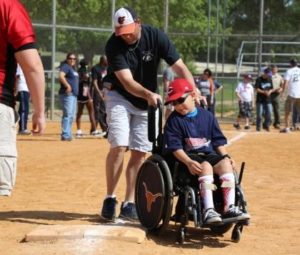When establishing a Special Needs Trust (SNT), one thing trustees want to know up front is what kinds of things can be paid for by the SNT on the beneficiary’s behalf. Whenever the SNT is set up, an instructional letter should always be provided that explains the successful operation of the trust. I wanted to write this blog post to provide some guidance regarding distribution from a Special Needs Trust are allowed.
There are several different types of SNTs. There are “first party” and “third party” SNTs. An SNT is often used when proper planning is done for a disabled person who may need certain government benefits, such as Medicaid, federal subsidized housing, and Supplemental Security Income programs (SSI) (hereinafter collectively “Federal Welfare Programs”).

Although I will not go into detail about these programs here, it is important to understand that if the disabled beneficiary applies for benefits under any of these programs the assets held in the SNT will not be used in determining how much income the beneficiary earns or what assets he or she owns.
Permissible Distributions From the SNT
While the beneficiary is not receiving any type of benefits from programs such as Medicaid or SSI, the rules for if and when to make a distribution from the SNT are much more relaxed. You, as Trustee of the SNT, can make distributions in your sole discretion for the beneficiary’s care in a manner that you see fit. However, once the beneficiary qualifies for benefits under a Federal Welfare Program it is essential that you understand how to properly manage and maintain the SNT so that the beneficiary retains the benefits she receives.
Once the beneficiary receives Federal Welfare Program benefits, federal laws allow only certain distributions from the SNT. The following list is provided for purposes of description and does not limit you, as the Trustee, in making other distributions for other items or amenities that the Trustee may believe are in the best interest of the beneficiary.
However, Nevada welfare administrators (who work with individuals receiving certain Federal Welfare Program benefits) do not always correctly follow the law in this area. Careful attention should be paid to the distributions made from the SNT while the beneficiary resides in Nevada, where termination or denial of benefits may occur even though such a denial of benefits is in violation of applicable law.
Distributions may include, but are not limited to:
- Automobile/Van
- Accounting services
- Acupuncture/acupressure
- Alternations or mending to clothing and shoe repairs
- Appliances (TV, VCR, stereo, microwave, stove, refrigerator, washer/dryer and
- maintenance or repairs to these appliances)
- Bottled water or water service
- Bus pass/public transportation costs
- Camera, film, recorder and tapes, development of file, photo albums, scrapbooks
- and supplies
- Clothing
- Clubs and club dues (record clubs, book clubs, health clubs, service clubs, zoo, advocacy groups, museums
- Computer hardware, software, maintenance/service and internet services
- Conferences and travel related to the same
- Courses or classes (academic or recreational), including supplies
- Curtains, blinds, drapes and the like
- Dental work not covered by Medicaid, including anesthesia
- Down payment on a home or security deposit on an apartment
- Dry cleaning and/or laundry services and/or supplies
- Elective surgery (if not covered by Medicaid)
- Fitness equipment
- Funeral expenses
- Furniture, home furnishings and insurance
- Gasoline and/or maintenance for automobile
- Haircuts/salon services
- Holiday decorations, parties, holiday cards
- Home alarm and/or monitoring/response systems
- Home improvements, repairs and maintenance (not covered by Medicaid, including tools to perform the repairs/maintenance)
- A home purchase (to the extent not covered by benefits)
- House cleaning/maid services, lawn services and snow removal services
- Independent care managers or case managers
- Insurance (automobile, home and/or possessions)
- Legal fees/advocacy
- Linens, towels, bedding and other household furnishings
- Massage, facials and other similar services/treatments
- Musical instruments, lessons and music sheets/books
- Non-food grocery items (laundry soap, bleach, fabric softener, deodorant, dish soap, hand and body soap, personal hygiene products, paper towels, napkins, facial tissue, toilet paper, and any household cleaning products)
- Over the counter medications (including vitamins and herbs, etc.)
- Personal assistance services not covered by Medicaid
- Pet and pet supplies, veterinary services
- Physician specialists if not covered by Medicaid
- Private counseling if not covered by Medicaid
- Repair services (appliance, automobile, bicycle, household, fitness equipment, etc.)
- Sporting goods, equipment, uniforms, team pictures, travel to games/tournaments
- Stationary, stamps, cards, etc.
- Storage units
- Taxi cab fees
- Telephone service and equipment, including a cell phone or pager
- Therapy (physical, occupational, speech), if not covered by Medicaid
- Tickets to concerts or sporting events (for the beneficiary and an accompanying companion)
- Transportation-related costs (including automobile, motorcycle, bicycle, moped, the purchase of gas, bus passes, etc.)
- Utility bills (including satellite/cable TV)
- Vacation (including paying for personal assistance to accompany the beneficiary)
Certain distributions from the SNT will reduce SSI benefits that the beneficiary may receive. These include using SNT funds for:
- Basic shelter-related expenses
- Food
- Distributing cash for any purpose
Finally, some SNT distributions are explicitly prohibited in the event that the beneficiary receives Federal Welfare Program benefits. These include:
a. Paying for a service already paid for by another source
b. Making a distribution that is not in the best interest of the beneficiary (i.e., the distribution is made for the primary benefit of another person)
I want to emphasize again that until disabled person applies for a program such as Supplemental Security Income or Medicaid, these limits and restrictions will not apply. However, once the SNT beneficiary is receiving benefits, following the rules outlined above is paramount.

